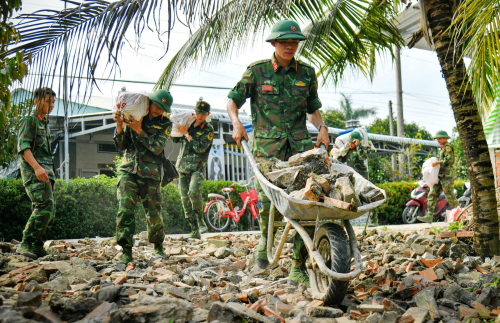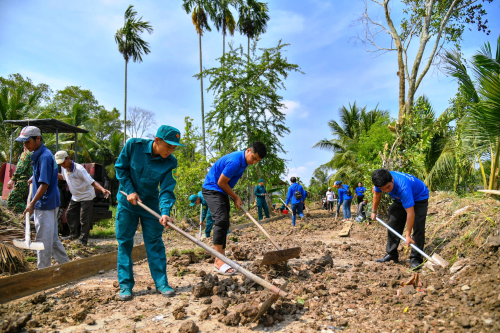Kien Giang is coastal, border province of Mekong River Delta. It has 15 districts and cities including 144 communes, wards, and townships; Khmer people account for over 13% of its population (ranking third in Mekong River Delta). Over the years, the emulation Movement titled “Joining hands to build new-style rural areas” across the province has been implemented extensively. As a result, the countryside has experienced a lot of progressive changes; rural traffic and socio-economic infrastructures have been developed; importance has been attached to education, healthcare, and rural environment hygiene work; the people’s material and mental life has been bettered. Emphasis has been placed on building the Party and political system with the improved operational quality and efficiency; defence and security have been strengthened. Up to now, 111 communes and 7 districts and cities within the province have accomplished the building of new-style rural areas; 19 communes have met advanced new-style rural area standards. Those good results have been attributed to the tireless efforts of all-level party committees and authorities and all sectors, forces, and people across the province. In this regard, the provincial armed forces have joined hands to build new-style rural areas via appropriate measures of utmost importance.
 |
| Cadres and soldiers of the provincial armed forces help the people to build a rural road in Vinh Hoa Hung Bac commune, Go Quao district |
First of all, the Provincial Military Party Committee (PMPC) and the Provincial Military Command (PMC) have directed offices and units to actively take part in building new-style rural areas. The PMPC and PMC have required all-level party committees and commands to keep grasping and effectively executing higher echelons’ guidance and plans on the emulation Movement titled “Military Region 9’s armed forces join hands to build new-style rural areas”. In the process, offices and units within the PMC have designed and implemented action plans for the emulation Movement in accordance with their functions, tasks, and capacity and the particularities of their stationed areas, with emphasis placed on 5 groups of tasks according to the Guidance set by the Military Region’s Steering Board for New-Style Rural Area Building. Offices and units, especially district-level military agencies have actively advised local party committees and authorities on building robust all-people national defence, firm postures of all-people national defence and people’s security, and strong political bases, eradicating hunger, reducing poverty, preventing and mitigating natural disasters, and conducting search and rescue operations. At the same time, they have worked with local sectors and unions and other forces in their areas to develop plans and agreements on coordination to implement the Movement on building new-style rural areas in a close, uniform, scientific manner without any overlaps. This approach has helped create a consensus among party committees and commands of offices and units, encouraging efforts and determination among cadres and soldiers to execute typical models, namely “military - civilian Tết holiday”, “military - civilian celebration of traditional Chol Chnam Thmay festival”, “houses of comradeship”, “providing support for children’s schooling”. Doing so has also contributed to settling issues at grass-roots level, successfully accomplishing military and defence tasks, and fostering socio-economic development within the province.
 |
| The militia and self-defence force and young union members take part in constructing a rural road in Minh Hoa commune, Chau Thanh district |
To make the Movement entitled “the armed forces of Kien Giang join hands to build new-style rural areas” more effective, the PMC has collaborated with the province’s Mass Mobilisation Commission, sectors, and unions as well as political - social and humanitarian organisations to implement the “military - civilian Tết holiday” program and mobilise resources for constructing local socio-economic infrastructures, particularly bridges, roads, schools, and houses for people in need, thereby contributing to boosting socio-economic and cultural development. In 2023 alone, the PMC advised the Provincial People’s Committee to successfully organise the “military - civilian Tết holiday” program in Binh Giang commune (Hon Dat district) and the “military - civilian celebration of traditional Chol Chnam Thmay festival” in An Minh Bac commune (U Minh Thuong district); those programs were also organised within other communes across the province with the total cost of 150 billion VND. Besides, the provincial armed forces have assisted localities in constructing 88 houses, 10 bridges, and 1 road, while giving 2,000 gifts to families under preferential treatment policy, poor and near-poor households, and excellent poor pupils. At the same time, due attention has been paid to mobilising synergy from sectors and forces to build public works for socio-economic development, hunger eradication, and poverty reduction as well as to implement social welfare policies, thereby bolstering the tradition and virtues of “Uncle Ho’s Soldiers” in the people’s hearts and minds.
In addition to those above-mentioned things, the PMPC and PMC have directed offices and units to proactively collaborate with local party committees, authorities, sectors, and unions in conducting surveys, selecting poor households, grasping requests and expectations of families in need, particularly those who have residential and agricultural land but lack capital, labour force, and techniques for animal and crop husbandry; grounded on those surveys, plans with specific timings have been formulated to assist the target households in economic development and poverty eradication. The PMC has proactively collaborated with the provincial Farmers’ Association to organise refresher courses on transferring animal and crop husbandry models, with a view to fostering the people’s production and life. In 2023, over 4,000 donations from cadres and soldiers of the provincial armed forces were made to contribute more than 900 million VND and 800 million VND to “Day for the Poor” and “Paying Debt of Gratitude” Funds respectively, thereby providing considerable assistance for localities’ production development and families under preferential treatment policy. At the same time, the provincial armed forces have actively taken part in public education programs, encouraging children’s access to schooling, building and repairing classrooms, giving financial support and learning equipment to schools and pupils. The provincial armed forces have actively carried out propagation work to encourage to people to follow new cultural life, prevent and combat social evils, and well execute the Movement titled “All people unite in building new-style rural and civilised urban areas”. In 2023, the provincial armed forces provided free medical examination and medicine for over 1,500 citizens, giving over 2,000 gifts to families under preferential treatment policy and poor households, presenting excellent poor pupils with 100 scholarships worth more than 25 million VND; on national holidays, gifts worth over 3 billion VND were given to persons with meritorious services to the revolution and people in difficulty. Those contributions have enabled local party committees and authorities to meet 19 criteria for a new-style rural commune.
When it comes to the participation in building new-style rural areas, the PMPC and PMC have paid special regard to strengthening political system in tandem with national defence and security as an important criterion. The PMC has advised the Provincial Party Committee and the Provincial People’s Committee to execute higher echelons’ documents on building all-people national defence and defensive zones; it has given advice on stepping up propagation work to render cadres, party members, and citizens fully aware of the importance of defence and security tasks to the building of new-style rural areas. At the same time, it has assisted the province in consolidating Steering Boards for defensive zone construction at provincial and district levels, directing district-level defensive zone exercises and commune-level defensive combat exercises, and successfully holding provincial-level defensive zone exercises on schedule. It has also directed district-level military agencies to make the regular, militia and self-defence, and reserve forces, all-people national defence, and posture of people’s war increasingly strong as well as to build party organisations and mass organisations capable of meeting their task requirements at grass-roots level. Emphasis has been placed on both qualitatively and quantitatively building the militia and self-defence force with great political credibility. Up to now, all commune-level military party cells have established their party committees; the percentage of members of the militia and self-defence force in the population has been 1.2%, while the rate of party members within this force has been 28.62%. The reserve force has been closely managed and sufficiently staffed in accordance with its task requirements, with the rate of party members standing at 15.16%. Citizens at military service age have been carefully selected and conscripted into the Military in a close manner; as a result, the province has always reached targets of military call-up on a yearly basis. Besides, soldiers fulfilling their military service have been provided with vocational orientation and training in their localities, while consideration has been given to selecting and sending cadres to grass-roots military training courses in order to reinforce local military agencies in a stable way.
Those good results mentioned above will lay a solid foundation for the provincial armed forces to keep joining hands to build new-style rural areas and provide support for the Party Organisation, Authority, and people of Kien Giang province to overcome difficulties and satisfy criteria set by the National Target Program on new-style rural area building.
Sr. Col. LE HOANG VU
Political Commissar of the PMC